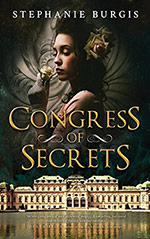
![]() Nymeria
Nymeria
11/17/2016
![]()
If I enjoyed Stephanie Burgis' previous book, Masks and Shadows, this one went well beyond any expectations I had, after my first encounter with this writer. Congress of Secrets is far richer and multi-faceted than its predecessor and I enjoyed it very much, as the levels of tension and intrigue kept me glued to the pages until the end. The story is set a few decades after the events of Masks and Shadows, and follows new characters, although there is a passing mention of Marie Dommaier, the young maid-turned-opera singer, who seems to have become very famous and whose role appears to be the handing of the narrative baton to the new players.
Caroline Wyndham, a wealthy English widow, hides a secret: she was born Karolina Vögl, daughter of a Viennese printer arrested by the secret police twenty-five years previously for his illegal anti-establishment pamphlets. Karolina herself was a prisoner of Count Pergen, the head of the secret police, who held her--and other equally forgotten victims--as a subject for his experiments in dark magic and alchemy for several years. She is now back in Vienna, with the pretext of following the Congress being held on the wake of Napoleon Bonaparte's defeat: her real goal is to find a way to free her father, the only one of Pergen's inmates still to be released.
Michael Steinhüller is a professional con artist, and his latest scheme involves passing himself as a dispossessed Russian noble come to Vienna to obtain reparations for the losses suffered during Bonaparte's campaigns of conquest. He's no stranger to Caroline, either, since he was her father's apprentice when the police came to arrest them all, and her last image of him--and Michael's recurring shameful memory--is of Michael running for his life as the printer's shop was torched. When he meets Karolina/Caroline again, the past threatens to infringe on their respective plans and to intrude with uncomfortable memories and unspoken feelings.
Around these two main characters moves a number of either fictional or historical figures, making once more this novel a rich tale that intrigues with its core story and stimulates curiosity toward the events being depicted: if Peter Riesenbeck, the leader of an acting troupe traveling to Vienna in search of success and fame, is an imaginary construct, and the unwitting lynchpin around which part of the drama unfolds, there are also some very real people moving across the stage and weaving seamlessly between reality and fantasy. There is Emperor Francis and the dark secrets he shares with evil Count Pergen, another all too true figure from the past; or we encounter famous politicians as Talleyrand and Metternich; or again my favorite among the secondary players, the Prince de Ligne, who I discovered was a flesh-and-blood person, widely known for his wit and his scorn of political expedience: his friendship with Caroline and his avuncular curiosity toward her, and the mystery she represents, is one of the highlights of the story.
Of course much revolves around Caroline and Michael's meeting, the emotional undercurrents of their past and present and the misunderstandings that threaten to drive them further apart: once more I commend Ms. Burgis for not placing the romance at the center of the story, but using it simply as part of the plot, leaving the daring schemes of the two under the spotlight. Caroline herself is an intriguing character: like her virtual "sister" Charlotte von Steinbeck in Masks and Shadows, she works within the era's social conventions, but manages to wield whatever power she can muster with skill and courage, driven by the need to free her father and the guilt she feels for the long years she was forced to abandon him to his destiny. Caroline is no innocent--her truncated childhood saw to that in no small measure--and she's not an angel either, able as she is to employ her feminine wiles to advantage, but at the same time her past experiences and the deals she had to make have not hardened her completely, and she retains a core of vulnerability that gives her personality a delightful complexity.
The magic elements of the novel are just as intriguing--and frightening: the darkness that inhabits count Pergen and allows him to draw energies from his victims, shifting them to himself or other recipients not unlike a blood transfusion, seems to have a connection with the dark, formless shapes that we saw in Masks and Shadows, and maybe is a sort of evolution of that entity, or a side manifestation. Much is left to the imagination and not explained completely (something I approve of) and the very insubstantial nature of the phenomenon is what makes it so terrifying and believable, especially in the final scenes of the unfolding drama.
If the story seems to end with a somewhat easy "and they lived happily thereafter", it does so in a very satisfactory way - and after the horror and anguish visited on the characters for most of the time, I think they deserve it, and so do the readers. The added value in this novel, even more than in its predecessor, lies in the curiosity that the author manages to instigate in her audience about the historical period in which the action is set, and in the real-life figures presented there. As always, a book that makes me think, besides its entertainment value, is a good one.
Very, very highly recommended.
http://spaceandsorcery.wordpress.com